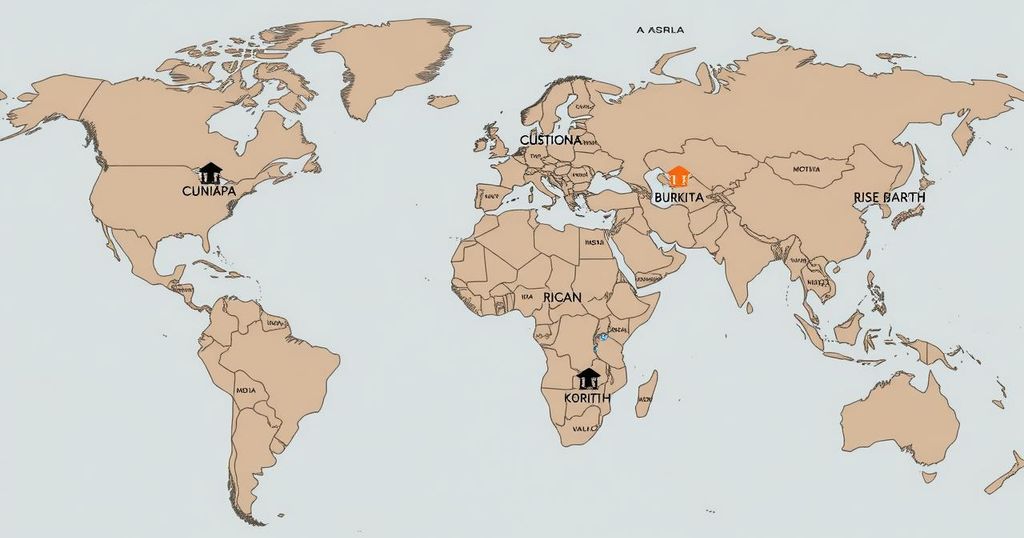Global news
ACLU, AFRICA, AMERICAN CIVIL LIBERTIES UNION, CUBA, DHS, HUMAN_RIGHTS, INTERNATIONAL REFUGEE ADMISSIONS PROJECT, INTERNATIONAL RELATIONS, IRAP, NORTH AMERICA, SANCTIONS, SOUTH AMERICA, STATE DEPARTMENT, SUDAN, SUPREME COURT, TERRORISM, TRUMP, U. S, U. S. SUPREME COURT, US, VENEZUELA
Isaac Bennett
0 Comments
Trump Administration Considers New Entry Restrictions for Select Countries
The Trump administration plans to impose new entry restrictions on travelers from Afghanistan, Pakistan, and other nations as part of a security review. Following an Executive Order, officials are considering limiting admissions due to concerns about inadequate vetting processes. Their decisions have attracted significant criticism and opposition from numerous civil rights groups.
The Trump administration is reportedly gearing up to impose new entry restrictions for travelers from several nations, including Afghanistan, Pakistan, Iran, Libya, Somalia, Sudan, Syria, Yemen, Chad, North Korea, and Venezuela. This initiative follows an Executive Order signed on January 20, which directs federal agencies to evaluate countries lacking adequate security screening and vetting operations. The newly proposed policy is aimed at tightening entry requirements, with potential consideration for partial or complete suspensions of admissions from these nations. An official announcement regarding the specific countries affected is anticipated shortly.
During President Trump’s initial term, a series of travel bans were implemented, beginning in 2017, targeting several nations, particularly focusing on those with Muslim-majority populations. This policy attracted significant backlash, leading opponents to label it a “Muslim Ban.” Despite facing various legal challenges, the U.S. Supreme Court upheld the third iteration of the ban in 2018, asserting that it was within the President’s constitutional authority to enforce national security measures.
While the finalized list of restricted nations has not been established, reports indicate that Afghanistan and Pakistan are under consideration for potential restrictions. Advocacy organizations, such as the International Refugee Admissions Project (IRAP), have expressed grave concerns regarding the implications of these restrictions, particularly for Afghan refugees, including Special Immigrant Visa (SIV) holders, who are escaping persecution from the Taliban.
Furthermore, Pakistan faces scrutiny due to alleged security issues and deficiencies in its vetting processes. Should Pakistan be included in the ban, it could adversely affect thousands of Pakistani nationals seeking entry visas to the United States.
Opposition to the impending travel ban has emerged rapidly. Civil rights groups, including the American Civil Liberties Union (ACLU), have denounced the potential measures, claiming they would lead to unjust restrictions on travel. Critics maintain that the State Department and the Department of Homeland Security (DHS) already employ one of the strictest vetting systems globally, rendering additional restrictions unwarranted.
The Trump administration’s review is being conducted under the Executive Order, which mandates that the Department of State and DHS complete their assessments within 60 days, as the deadline approaches. Consequently, an official announcement regarding the prospective restrictions is expected shortly.
For further updates, individuals may refer to the official websites of the U.S. Department of State and the Department of Homeland Security.
In summary, the Trump administration is implementing a review that could enforce new entry restrictions on travelers from several key nations, including Afghanistan and Pakistan, as part of heightened security measures. This consideration arises amidst concerns from advocacy groups regarding its impact on vulnerable populations. Widespread opposition, including strong criticism from civil rights organizations, highlights the contentious nature of these potential restrictions, emphasizing that existing vetting procedures may be sufficient.
Original Source: www.travelandtourworld.com




Post Comment